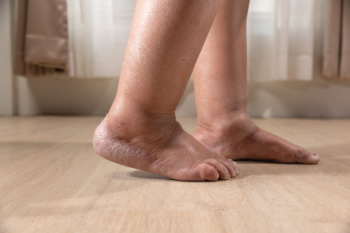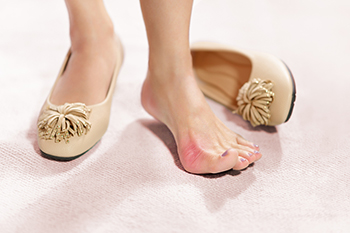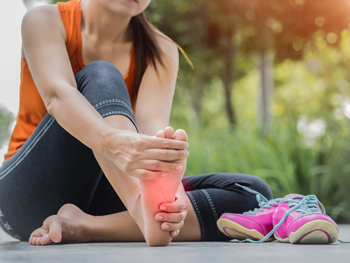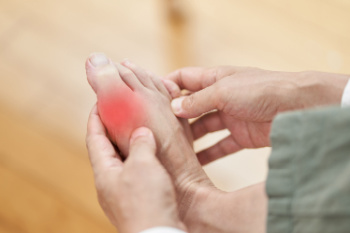Items filtered by date: June 2024
What Are Common Causes of Swollen Feet and Ankles?

Swollen feet and ankles are a common issue with a variety of causes. Injuries such as sprains or fractures can lead to immediate swelling due to tissue damage and inflammation. Diseases, including heart, liver, or kidney problems, can cause fluid retention, leading to swelling in the feet and ankles. Infections, especially in individuals with diabetes or compromised immune systems, can also result in swelling in these areas. Certain medications, such as those for blood pressure or hormonal therapy, can cause fluid retention and swelling as a side effect. Pregnancy often leads to swollen feet due to increased body fluid and pressure from the growing uterus. Edema, the medical term for fluid buildup in tissues, can be caused by prolonged standing, sitting, or underlying health conditions. If your feet or ankles have become swollen, it is suggested that you visit a podiatrist who can determine what the reason is, and offer appropriate treatment remedies.
Swollen feet can be a sign of an underlying condition. If you have any concerns, contact the foot specialists of Table Mountain Foot and Ankle. Our doctors can provide the care you need to keep you pain-free and on your feet.
Swollen feet are a common ailment among pregnant women and people who stand or sit for extended periods. Aging may increase the possibility of swollen feet and patients who are obese often notice when their feet are swelling too. There may be medical reasons why swollen feet occur:
- Phlebitis - A condition that causes the veins to become inflamed and can also cause leg pain.
- Liver disease - This may lead to low blood levels of albumin which is a protein. This can cause fluid in the blood to pass into the tissues and several areas of the body can become swollen.
- Heart failure - When the heart doesn’t pump properly the blood that is normally pumped back to the heart can pool in the veins of the legs causing swollen feet.
- Kidney disease - One of the main functions of the kidneys is releasing excess fluid in the body. This type of condition can make it difficult for the kidneys to function properly, and as a result the feet may become swollen.
- Deep-vein thrombosis (DVT)- This is a serious condition where blood clots form in the veins of the legs. They can block the return of blood from the legs to the heart which may cause the feet to swell. It is important to be treated by a podiatrist if this condition is present.
Swollen feet can also be caused by bone and tendon conditions, including fractures, arthritis, and tendinitis. Additionally, there may be skin and toenail conditions and an infection may cause the feet to swell. Patients who take medicine to treat high blood pressure may be prone to getting swollen feet.
Many patients elevate their feet to help relieve the swelling and this is generally a temporary remedy. When a podiatrist is consulted the reason behind the swelling can be uncovered and subsequently treated.
If you have any questions please feel free to contact our office located in Wheat Ridge, CO . We offer the newest diagnostic tools and technology to treat your foot and ankle needs.
Do You Suffer From Painful Feet?
Bunions and Their Effects on Women

Bunions, or hallux valgus, disproportionately affect women, significantly impacting their overall foot health. Women are particularly susceptible due to factors like frequent wearing of high-heeled or narrow shoes, along with genetic predispositions. The risk of bunions has been shown to increase with age. The formation of a bunion starts with the big toe bending toward the smaller toes, which leads to a painful bony protrusion on the side of the foot. As bunions progress, they disrupt the alignment and function of adjacent toes. This often leads to formation of hammertoes or claw toes, altered weight distribution, corns and calluses. Research suggests that the severity of bunions correlates with increased pain not only in the feet but also in other parts of the body. Family history and flat feet are other contributing factors to the development of bunions. Addressing bunion deformity through early and effective interventions can offer significant relief and improve overall quality of life. If you are experiencing bunion-related discomfort, it is suggested that you make an appointment with a podiatrist for an exam and treatment.
If you are suffering from bunion pain, contact the foot specialists of Table Mountain Foot and Ankle. Our doctors can provide the care you need to keep you pain-free and on your feet.
What Is a Bunion?
Bunions are painful bony bumps that usually develop on the inside of the foot at the joint of the big toe. As the deformity increases over time, it may become painful to walk and wear shoes. Women are more likely to exacerbate existing bunions since they often wear tight, narrow shoes that shift their toes together. Bunion pain can be relieved by wearing wider shoes with enough room for the toes.
Causes
- Genetics – some people inherit feet that are more prone to bunion development
- Inflammatory Conditions - rheumatoid arthritis and polio may cause bunion development
Symptoms
- Redness and inflammation
- Pain and tenderness
- Callus or corns on the bump
- Restricted motion in the big toe
In order to diagnose your bunion, your podiatrist may ask about your medical history, symptoms, and general health. Your doctor might also order an x-ray to take a closer look at your feet. Nonsurgical treatment options include orthotics, padding, icing, changes in footwear, and medication. If nonsurgical treatments don’t alleviate your bunion pain, surgery may be necessary.
If you have any questions, please feel free to contact our office located in Wheat Ridge, CO . We offer the newest diagnostic and treatment technologies for all your foot care needs.
Arch Support Needs and Running Shoes

Selecting the ideal running shoe with proper arch support is essential for avid runners, as it significantly reduces the risk of common injuries, such as tendonitis or shin splints. Arch support plays a pivotal role in correcting gait issues, ensuring a more efficient and comfortable running experience. When looking for running shoes, it is important to consider various factors, including terrain, distance, and individual arch type. Runners with low arches may benefit from stability shoes, which provide extra support to prevent overpronation, while those with normal or high arches may find neutral shoes more suitable. Comfort should always be a priority, regardless of arch type. To pinpoint the perfect shoe, seeking guidance from a podiatrist can help. This foot doctor can evaluate your arch type and gait pattern to determine the most suitable footwear for your needs, helping to minimize the risk of injury. If you are experiencing arch pain after a run, it is suggested that you schedule an appointment with a podiatrist for an exam and treatment options, which may include custom orthotics.
If you are a runner, wearing the right running shoe is essential. For more information, contact the foot specialists from Table Mountain Foot and Ankle. Our doctors can provide the care you need to keep you pain-free and on your feet.
Choosing the Right Running Shoe for Your Foot Type
To increase performance and avoid the risk of injury, it is important to choose the right running shoe based on your foot type. The general design of running shoes revolves around pronation, which is how the ankle rolls from outside to inside when the foot strikes the ground.
- Neutral runners are able to choose from a wide variety of shoes, including minimalist shoes or even going barefoot.
- Runners who overpronate, or experience an over-abundance of ankle rolling, should choose shoes that provide extra motion control and stability.
- Runners who underpronate, or supinate, have feet that have high arches and lack flexibility, preventing shock absorption. They require shoes with more flexibility and cushion.
If you have any questions please feel free to contact our office located in Wheat Ridge, CO . We offer the newest diagnostic and treatment technologies for all your foot and ankle needs.
Symptoms and Management of Early Onset Gout

Early onset gout, a form of arthritis, can be a debilitating condition that disrupts daily life and impacts overall well-being. Gout typically manifests as sudden and intense pain, swelling, and tenderness in the joints, often affecting the big toe initially. This inflammatory response occurs due to the buildup of uric acid crystals in the joints, resulting from an imbalance in the body's production and excretion of uric acid. While gout is commonly associated with older age and certain lifestyle factors, like diet and alcohol consumption, it can also develop in younger individuals, often due to genetic predisposition or underlying health conditions. Managing early onset gout involves a multifaceted approach, including medication to alleviate symptoms, dietary modifications to reduce purine-rich foods, and lifestyle changes to maintain a healthy weight and minimize alcohol intake. Gout typically affects the big toe, and can cause severe pain and discomfort. If you have been afflicted with gout, it is suggested that you seek prompt attention from a podiatrist who can offer you relief and prevention methods.
Gout is a painful condition that can be treated. If you are seeking treatment, contact the foot specialists from Table Mountain Foot and Ankle. Our doctors will treat your foot and ankle needs.
What Is Gout?
Gout is a form of arthritis that is characterized by sudden, severe attacks of pain, redness, and tenderness in the joints. The condition usually affects the joint at the base of the big toe. A gout attack can occur at any random time, such as the middle of the night while you are asleep.
Symptoms
- Intense Joint Pain - Usually around the large joint of your big toe, and it most severe within the first four to twelve hours
- Lingering Discomfort - Joint discomfort may last from a few days to a few weeks
- Inflammation and Redness -Affected joints may become swollen, tender, warm and red
- Limited Range of Motion - May experience a decrease in joint mobility
Risk Factors
- Genetics - If family members have gout, you’re more likely to have it
- Medications - Diuretic medications can raise uric acid levels
- Gender/Age - Gout is more common in men until the age of 60. It is believed that estrogen protects women until that point
- Diet - Eating red meat and shellfish increases your risk
- Alcohol - Having more than two alcoholic drinks per day increases your risk
- Obesity - Obese people are at a higher risk for gout
Prior to visiting your podiatrist to receive treatment for gout, there are a few things you should do beforehand. If you have gout you should write down your symptoms--including when they started and how often you experience them, important medical information you may have, and any questions you may have. Writing down these three things will help your podiatrist in assessing your specific situation so that he or she may provide the best route of treatment for you.
If you have any questions, please feel free to contact our office located in Wheat Ridge, CO . We offer the newest diagnostic and treatment technologies for all your foot care needs.

